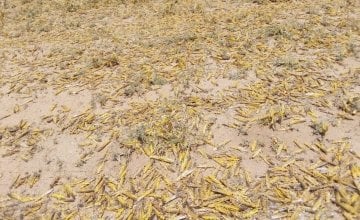
Read our 2024 annual report

Knowledge Hub
Concern launches emergency appeal as locusts threaten food for 13 million people

Concern Worldwide today launched an emergency appeal for funds to prevent a major humanitarian crisis in east Africa as massive swarms of desert locusts threaten food supplies of 13 million people.
“Swarms of locusts are sweeping through the region eating everything in sight – leaves, crops and grass,” Concern’s Director of International Programmes Anne O’Mahony said. “A swarm can strip a field in minutes.”
“For pastoralist farmers it means they have no fodder for their livestock. Farmers who were preparing to harvest crops have watched as locusts devoured both their plants and the seeds they need for next year’s crop. It is a disaster.”
“It is just so unfair for these vulnerable communities who have come through years of drought and were then hit by flooding to see them lose everything in this way.”
Concern is responding
Concern Worldwide is working with affected communities in Kenya, Somalia and Ethiopia and is responding by providing cash payments to families to buy fodder for livestock, food, seeds, agricultural tools and other basic items.
The Food and Agriculture Organisation of the United Nations (FAO) described the desert locust as the world’s most destructive migratory pest, with a swarm of one square kilometre capable of eating the same amount of food as 35,000 people. There are currently reports in Kenya of swarms measuring 60 kilometres by 40 kilometres devastating communities.
The locust infestation is expected to drive up the price of food in affected countries and the wider region, Ms O’Mahony warned: “This will have knock-on effects on those living in urban slums, potentially tipping them into a crisis situation.”
Locusts breeding
In addition to the 13 million people currently at risk, the FAO this week warned that a further 20 million are at risk if the locusts continue to spread. The UN agency, in conjunction with national governments, are working to spray the locusts to control them. However it is a race against time.
The current hot, wet conditions are perfect for the locusts to breed and the next wave of locusts are already hatching on the ground and are expected to swarm by March or April, causing further damage, unless they are controlled by spraying. The FAO estimates that the number of locusts could be 500 times greater by June unless effective control measures are taken.
Concern CEO Dominic MacSorley urged the Irish public to support the appeal. “With donations from the Irish public, Concern is working with communities which were already extremely vulnerable after years of drought and recent floods, to prevent the current locust infestation becoming a major humanitarian crisis,” he said. “We urgently need the public’s support over the coming months as we face this massive challenge.”
To donate visit www.concern.net or phone 1850 211 844.
For media queries contact Eamon Timmins, Media Relations Manager, Concern Worldwide, at 01 417 7712, 087 9880524 or by emailing eamon.timmins@concern.net
Our impact in 2024
people reached through our emergency response
people reached through our health interventions
people reached through our livelihoods programmes
Other ways to help
Corporate support
Is your company interested in working together for a common cause?
Fundraise for Concern
From mountain trekking to marathon running, cake sales to table quizzes, there are lots of ways you can support our work.
Buy a gift
With an extensive range of alternative gifts, we have something to suit everybody.
Leave a gift in your will
Leave the world a better place with a life-changing legacy.
Volunteer with Concern
The lots of ways to get involved with our work as a volunteer
School fundraising
Without the generous support from schools, we wouldn't be able to do the work that we do.




